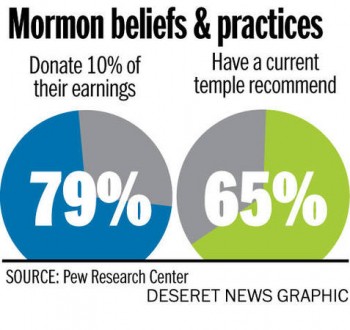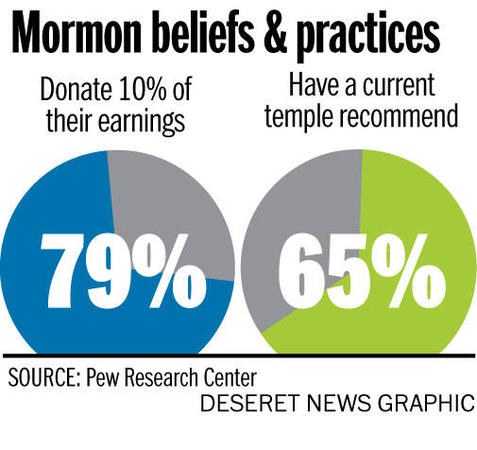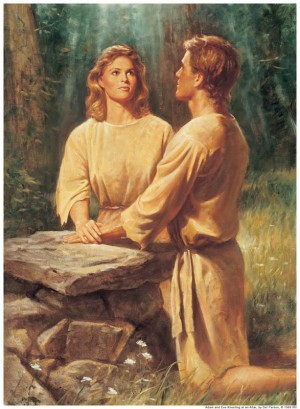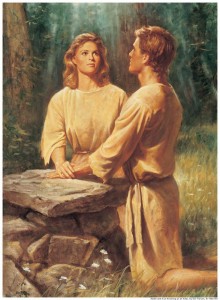
by brady | Feb 13, 2012 | About Mormons, Mormon Beliefs: Christian Values
By Jan Mayer, a member of The Church of Jesus Christ of Latter-day Saints . As a “Mormon woman,” Jan is a graduate of BYU and mother of five children. She has written for numerous publications, including The Denver Post, The Villager and NorthStar.

It must have been strange to see me–a 10- year old girl– kneeling on a lawn next to a busy street. It was on the long walk home from school that I wondered if I could talk to Heavenly Father at any time, like my Sunday School Teacher said. Although I had prayed many times at home and at meetings of The Church of Jesus Christ of Latter-day Saints, it had never felt this personal before.
 On that day, I told Heavenly Father that I was embarrassed to kneel out in the open, that I wasn’t sure what to say. Then, seeking for some purpose, I prayed to get home safely…feeling dumb because of course, I would get home safely…it was only a few blocks and I’d been safe every other day. (more…)
On that day, I told Heavenly Father that I was embarrassed to kneel out in the open, that I wasn’t sure what to say. Then, seeking for some purpose, I prayed to get home safely…feeling dumb because of course, I would get home safely…it was only a few blocks and I’d been safe every other day. (more…)

by brady | Feb 13, 2012 | About Mormons, Mormon Beliefs: Christian Values, Mormons in the News
By Dallin.
 It’s not often that you’ll find the New York Times, Los Angeles Times, Washington Post and CNN simultaneously and very suddenly begin publishing dozens of articles on a common and largely uncontroversial religious practice. Yet, as Mitt Romney’s presidential campaign released tax records showing Romney’s participation in paying tithing, these and other news outlets have been buzzing with explanations and possible implications. Everyone seems to want to know what tithing is and why it is so important to members of The Church of Jesus Christ of Latter-day Saints, sometimes nicknamed “Mormons.”
It’s not often that you’ll find the New York Times, Los Angeles Times, Washington Post and CNN simultaneously and very suddenly begin publishing dozens of articles on a common and largely uncontroversial religious practice. Yet, as Mitt Romney’s presidential campaign released tax records showing Romney’s participation in paying tithing, these and other news outlets have been buzzing with explanations and possible implications. Everyone seems to want to know what tithing is and why it is so important to members of The Church of Jesus Christ of Latter-day Saints, sometimes nicknamed “Mormons.”
The answers to those questions are in the Old Testament. Mormons join Jews and fellow Christians in their belief that the teachings and doctrines in this great book are the word of God. (more…)

by dwhite | Feb 6, 2012 | Mormon Beliefs: Christian Values
The Church of Jesus Christ of Latter-day Saints, often misnamed the “Mormon Church” by the media, does believe in the practice of what most Christian denominations call “Holy Communion.” Latter-day Saints, or “Mormons,” however, call this practice the Sacrament. Below are three responses to the question of “What do Mormons practice in regard to Holy Communion,” by three practicing Latter-day Saints:
Melissa says:
 Mormons (as members of The Church of Jesus Christ of Latter-day Saints are often called by those of other faiths) believe that the sacrament is an important ordinance that gives partakers an opportunity to renew their baptismal covenants. When we are baptised, we are cleansed of sin and declare ourselves members of Christ’s church, and the sacrament gives us an opportunity to “refresh” this commitment. Other Christian denominations typically refer to the partaking of bread and wine as “Holy Communion,” and that is basically what our sacrament is. There are, however, some very obvious differences in how we go about our communion. (more…)
Mormons (as members of The Church of Jesus Christ of Latter-day Saints are often called by those of other faiths) believe that the sacrament is an important ordinance that gives partakers an opportunity to renew their baptismal covenants. When we are baptised, we are cleansed of sin and declare ourselves members of Christ’s church, and the sacrament gives us an opportunity to “refresh” this commitment. Other Christian denominations typically refer to the partaking of bread and wine as “Holy Communion,” and that is basically what our sacrament is. There are, however, some very obvious differences in how we go about our communion. (more…)

by Karen | Jan 14, 2012 | About Mormons, Mormon Beliefs: Christian Values
Of all the numbers in the Pew Research Center’s recently released survey of “Mormons in America,” the highest, most overwhelming numbers are these: 98 percent of respondents said they believe in the Resurrection of Jesus Christ, and 97 percent say their church is a Christian religion.
 This comes on the heels of earlier surveys indicating that 32 percent of non-LDS U.S. adults say the LDS Church is not a Christian religion, and an additional 17 percent are unsure of LDS Christianity. The theological and semantic reasons for this can be complex, but for the 1,019 self-identified Mormons who participated in the Pew survey, their theological position is clear: Mormons believe in Jesus Christ, and they consider themselves to be Christian. (more…)
This comes on the heels of earlier surveys indicating that 32 percent of non-LDS U.S. adults say the LDS Church is not a Christian religion, and an additional 17 percent are unsure of LDS Christianity. The theological and semantic reasons for this can be complex, but for the 1,019 self-identified Mormons who participated in the Pew survey, their theological position is clear: Mormons believe in Jesus Christ, and they consider themselves to be Christian. (more…)

by brady | Dec 19, 2011 | Mormon Beliefs: Christian Values
Encyclopedia of Mormonism summarizes Eve’s role in the Fall as follows:
Satan was present to tempt Adam and Eve, much as he would try to thwart others in their divine missions: “and he sought also to beguile Eve, for he knew not the mind of god, wherefore he sought to destroy the world” (Moses 4:6). Eve faced the choice between
 selfish ease and unselfishly facing tribulation and death (Evidences and Reconciliations, by John A. Widtsoe, page 193). As befit her calling, she realized that there was no other way and deliberately chose mortal life so as to further the purpose of god and bring children into the world. (s.v. “Eve”)
selfish ease and unselfishly facing tribulation and death (Evidences and Reconciliations, by John A. Widtsoe, page 193). As befit her calling, she realized that there was no other way and deliberately chose mortal life so as to further the purpose of god and bring children into the world. (s.v. “Eve”)
Elder Dallin H. Oaks taught about the vital contribution of Eve in partaking of the fruit and of the difference between transgression and sin.
It was Eve who first transgressed the limits of Eden in order to initiate the conditions of mortality. Her act, whatever its nature, was formally a transgression but eternally a glorious necessity to open the doorway toward eternal life. Adam showed his wisdom by doing the same. And thus Eve and “Adam fell that men might be” (2 Ne. 22:25). (more…)

by brady | Dec 19, 2011 | Mormon Beliefs: Christian Values
Were Adam and Eve Cursed?
The answer to this question is no. Unfortunately, many view the Fall as having brought a curse upon both Adam and Eve. Such a view casts a false negative light on the fairness of the work of god. Such people mistakenly tend to use the scriptures that describe the scene right after the partaking of the forbidden fruit to teach that the Fall was a very negative thing, with resulting curses on Eve and also on Adam. They even engage in debates as to who got the worst curse, Adam or Eve. In so doing, they sadly and badly misinterpret the scriptures. The fact is that neither Adam nor Eve was cursed. The Fall was good for them and good for us. It worked in harmony with the Atonement. Satan was cursed and the earth was cursed “for their sake.” We will read the relevant verses and add some commentary as we go. First, we see that Satan was cursed.
 14 And the Lord god [the Father] said unto the serpent, Because thou hast done this, thou art cursed above [limited more than] all cattle, and above every beast of the field [one aspect of this curse is that even “cattle” and “every beast of the field” get a physical body to go with their spirit; Satan will never get a physical body]; upon thy belly shalt thou go [Satan will be looked upon as the lowest of the low], and dust shalt thou eat all the days of thy life [perhaps meaning that he will always be behind the Savior, in effect, “eating the Savior’s dust”; this could also be a play on words, saying, in effect, that Satan will be “eating dust,” in other words, associating with mortals, trying to swallow them up in spiritual destruction, but never receive a mortal body himself, one made of the “dust of the ground”—see Moses 3:7]: (more…)
14 And the Lord god [the Father] said unto the serpent, Because thou hast done this, thou art cursed above [limited more than] all cattle, and above every beast of the field [one aspect of this curse is that even “cattle” and “every beast of the field” get a physical body to go with their spirit; Satan will never get a physical body]; upon thy belly shalt thou go [Satan will be looked upon as the lowest of the low], and dust shalt thou eat all the days of thy life [perhaps meaning that he will always be behind the Savior, in effect, “eating the Savior’s dust”; this could also be a play on words, saying, in effect, that Satan will be “eating dust,” in other words, associating with mortals, trying to swallow them up in spiritual destruction, but never receive a mortal body himself, one made of the “dust of the ground”—see Moses 3:7]: (more…)


 On that day, I told Heavenly Father that I was embarrassed to kneel out in the open, that I wasn’t sure what to say. Then, seeking for some purpose, I prayed to get home safely…feeling dumb because of course, I would get home safely…it was only a few blocks and I’d been safe every other day. (more…)
On that day, I told Heavenly Father that I was embarrassed to kneel out in the open, that I wasn’t sure what to say. Then, seeking for some purpose, I prayed to get home safely…feeling dumb because of course, I would get home safely…it was only a few blocks and I’d been safe every other day. (more…)

 It’s not often that you’ll find the New York Times,
It’s not often that you’ll find the New York Times, 
 Mormons (as members of The Church of Jesus Christ of Latter-day Saints are often called by those of other faiths) believe that the sacrament is an important ordinance that gives partakers an opportunity to renew their baptismal covenants. When we are baptised, we are cleansed of sin and declare ourselves members of Christ’s church, and the sacrament gives us an opportunity to “refresh” this commitment. Other Christian denominations typically refer to the partaking of bread and wine as “Holy Communion,” and that is basically what our sacrament is. There are, however, some very obvious differences in how we go about our communion.
Mormons (as members of The Church of Jesus Christ of Latter-day Saints are often called by those of other faiths) believe that the sacrament is an important ordinance that gives partakers an opportunity to renew their baptismal covenants. When we are baptised, we are cleansed of sin and declare ourselves members of Christ’s church, and the sacrament gives us an opportunity to “refresh” this commitment. Other Christian denominations typically refer to the partaking of bread and wine as “Holy Communion,” and that is basically what our sacrament is. There are, however, some very obvious differences in how we go about our communion. 
 This comes on the heels of earlier surveys indicating that 32 percent of non-LDS U.S. adults say the LDS Church is not a Christian religion, and an additional 17 percent are unsure of LDS Christianity. The theological and semantic reasons for this can be complex, but for the 1,019 self-identified Mormons who participated in the Pew survey, their theological position is clear: Mormons believe in Jesus Christ, and they consider themselves to be Christian.
This comes on the heels of earlier surveys indicating that 32 percent of non-LDS U.S. adults say the LDS Church is not a Christian religion, and an additional 17 percent are unsure of LDS Christianity. The theological and semantic reasons for this can be complex, but for the 1,019 self-identified Mormons who participated in the Pew survey, their theological position is clear: Mormons believe in Jesus Christ, and they consider themselves to be Christian. 


 14 And the Lord god [the Father] said unto the serpent, Because thou hast done this, thou art cursed above [limited more than] all cattle, and above every beast of the field [one aspect of this curse is that even “cattle” and “every beast of the field” get a physical body to go with their spirit; Satan will never get a physical body]; upon thy belly shalt thou go [Satan will be looked upon as the lowest of the low], and dust shalt thou eat all the days of thy life [perhaps meaning that he will always be behind the Savior, in effect, “eating the Savior’s dust”; this could also be a play on words, saying, in effect, that Satan will be “eating dust,” in other words, associating with mortals, trying to swallow them up in spiritual destruction, but never receive a mortal body himself, one made of the “dust of the ground”—see Moses 3:7]:
14 And the Lord god [the Father] said unto the serpent, Because thou hast done this, thou art cursed above [limited more than] all cattle, and above every beast of the field [one aspect of this curse is that even “cattle” and “every beast of the field” get a physical body to go with their spirit; Satan will never get a physical body]; upon thy belly shalt thou go [Satan will be looked upon as the lowest of the low], and dust shalt thou eat all the days of thy life [perhaps meaning that he will always be behind the Savior, in effect, “eating the Savior’s dust”; this could also be a play on words, saying, in effect, that Satan will be “eating dust,” in other words, associating with mortals, trying to swallow them up in spiritual destruction, but never receive a mortal body himself, one made of the “dust of the ground”—see Moses 3:7]: